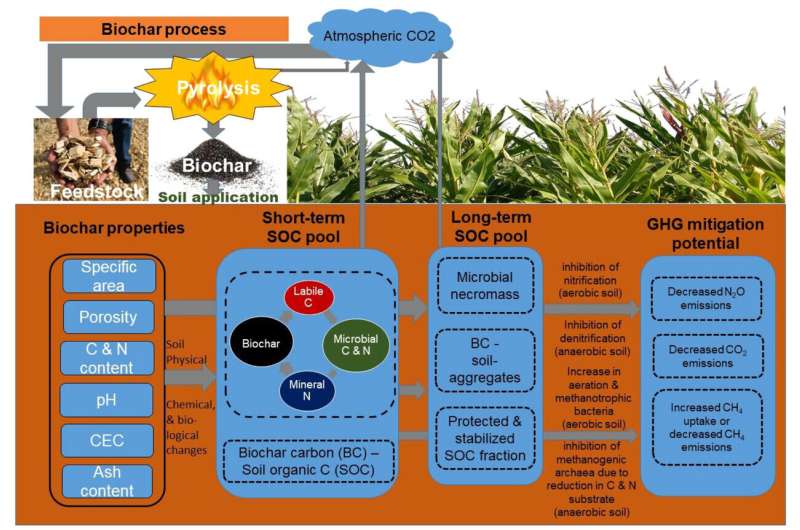Researchers want to use ‘biochar’ to combat climate change

A new review of research suggests that the nature-based technology biochar—a carbon-rich material—could be an important tool to use in agriculture to help mitigate climate change.
Made by pyrolysis, a process that involves heating organic material in a low-oxygen environment, biochar—a charcoal-like, porous substance—has long been utilized for crop production as a soil amendment or carbon sequestration agent. In recent years, researchers have seen a resurgence of heightened interest in the technology due to its unique physical structure and its various agricultural and environmental benefits.
It’s for these reasons that biochar’s potential to remove large amounts of greenhouse gases from the atmosphere deserves to be re-evaluated, said Raj Shrestha, lead author of the study and a research associate in horticulture and crop science at The Ohio State University.
“When farmers grow their crops, they apply fertilizer and/or manure and use different kinds of machinery to till the soil,” said Shrestha. “In the process, greenhouse gases are produced and released into the atmosphere.”
But farmers could lessen this impact by applying biochar to their fields, according to the paper, recently published in the Journal of Environmental Quality.
“If we can convince farmers that converting biomass to biochar is good for the long-term sustainability of soils, the economy, and good for the environment, then we’ll be able to see wide adoption of this technology,” said Shrestha.
The researchers reviewed more than 200 field studies conducted across the globe that examined the impact of biochar application in agriculture on emissions of nitrous oxide, methane and carbon dioxide—heat-trapping gases that cause Earth’s atmosphere to warm.
The team found that the amount of biochar in the soil does have variable effects on local greenhouse gas emissions, which range from a decrease to an increase, and, in some cases, no change. But in general, the team discovered that the use of biochar in field settings lowered the amount of nitrous oxide in the air by about 18% and methane by 3%.
Biochar alone was also not effective at reducing carbon dioxide emissions, but did help when combined with commercial nitrogen fertilizer or other organic materials, like manure or compost.
“We can achieve negative emission in our agroecosystems by reducing the carbon source and enhancing carbon sink,” said Shrestha. Reducing Earth’s carbon source can be achieved by reducing greenhouse gas emissions from our activities, and enhancing carbon sink—increasing the technology’s ability to absorb more carbon than it releases into the atmosphere—can be done by increasing the long-term soil carbon pool through conversion of organic waste into biochar, he said.
“What’s good about biochar is that it contributes to both these aspects to create net negative agriculture,” said Shrestha.
“Right now, when farmers leave crop residue on the field, only about 10% to 20% of the residue carbon is recycled into soil during the decomposition process, but by converting the same amount of residue to biochar and then applying it to the field, we can store about 50% of that carbon into stable carbon forms.”
As biochar-carbon placed in the soil can also last anywhere from a few hundred to thousands of years, it’s currently one of the proposed best management practices for achieving negative emissions and preventing Earth’s average temperature from increasing to 1.5 degrees Celsius above pre-industrial levels.
According to the study, between 2011 and 2020, global greenhouse gas emissions rose: carbon dioxide by about 5.6%, methane by 4.2%, and nitrous oxide by 2.7%—and agriculture accounts for about 16% of these emissions. While such levels have already led to irreversible changes to the global climate system, Shrestha said that future damages could be slowed by helping to curb the extent of emissions from the farming and forestry sectors.
Yet despite biochar’s potential as a negative emission technology and the recent increase in biochar-related research, it’s difficult to get farmers to apply it, partly because it hasn’t been commercialized for widespread use or promoted well, said Shrestha.
To better deliver more science-based, practical information about the technology and its benefits to farmers and agriculture-related businesses, many lawmakers have enacted policies meant to investigate its effectiveness across many different soil types and environmental conditions. It’s an objective that Shrestha shares, as the main goal of his team’s review paper is to improve farmers’ confidence in biochar so that more of them choose to adopt it sooner.
More information:
Raj K. Shrestha et al, Biochar as a negative emission technology: A synthesis of field research on greenhouse gas emissions, Journal of Environmental Quality (2023). DOI: 10.1002/jeq2.20475
Citation:
Researchers want to use ‘biochar’ to combat climate change (2023, May 23)
retrieved 23 May 2023
from https://phys.org/news/2023-05-biochar-combat-climate.html
This document is subject to copyright. Apart from any fair dealing for the purpose of private study or research, no
part may be reproduced without the written permission. The content is provided for information purposes only.
For all the latest Science News Click Here
For the latest news and updates, follow us on Google News.

